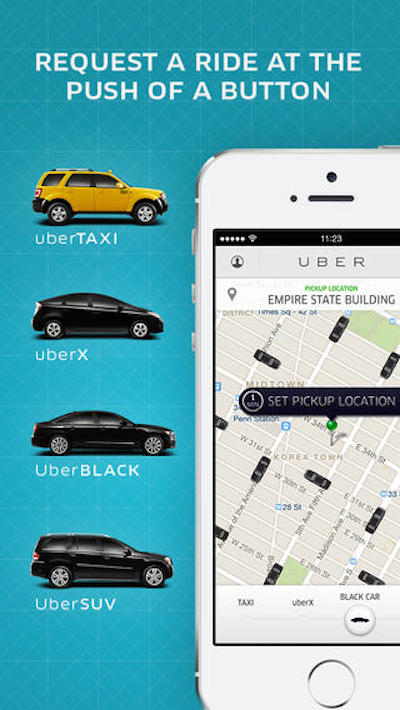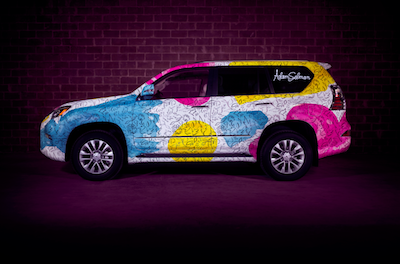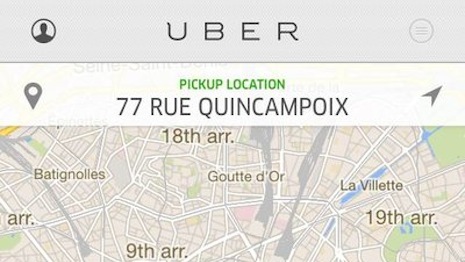The growth in alternative modes of transportation is disrupting the automotive industry tremendously, especially with millennial buyers.
As services such as Uber and Lyft emerge, vehicle manufacturers need to shift their strategies to cater to the millennial demographic, whose travel habits have been greatly altered. However, all consumers are now traveling differently as well, with one in seven claiming that mobility services have an affect on their vehicle purchasing, according to Foresight Research.
“This group is critical to allow automakers to gauge the potential impact of alternative mobility options on future vehicle purchases,” said Chris Stommel, president of Foresight Research. “Mobility options were used by almost six in ten new car buyers in the past year.
"Usage jumps to seven in ten Millennials and almost three-quarters of luxury brand buyers,” he said. “A majority use alternative transportation while travelling and about one-third when they are out for the evening.
"A small group uses them for day-to-day travel around town and errands.”
Automotive purchasing
The digital age has drastically impacted how consumers behave, especially within the travel industry. With services such as Uber, and public transportation becoming more user friendly with mobile applications and digital services, consumers are more likely to take alternative methods to go from point A to point B.

Uber's app
One in five millennials claim that the use and availability of alternative transportation impacts their decision to purchase vehicles.
Automotive brands needs to increase their presence in alternative transportation, instead of competing with the industry.
For example, Toyota Corp.'s Lexus made the most out of its sponsorship for New York Fashion Week with a customized fleet of vehicles by designers to transport guests to and from events.
Designers from NYFW and the alternative MADE show, known for helping up-and-coming creators, lent their creativity in the development of wrapped vehicles. The campaign not only allowed attendees to arrive in style, but also showcased prints that then appeared on fashion during the designers’ shows (see more).

Adam Selman designed lexus
Affluent consumers are both purchasing vehicles, while also using alternative transportation such as Uber or car services. As per standard consumers, men make up the majority of alternative transportation users while women only leverage these methods a little.
Uber partnerships
Many automotive brands are adopting partnerships with Uber to continue adapting through the disruption.
For instance, British automaker McLaren partnered with mobile app Uber in Dubai, United Arab Emirates, to bring the innovative concepts of both brands to consumers and fans.
Uber users in the city were given a surprise when a McLaren vehicle pulled up to their designated location for their taxi pick-up. The British automaker gave Uber consumers another shock when they were handed the keys to drive the vehicle, leaving a user-friendly campaign that likely resonated with participants who unexpectedly interacted with the brand (see more).
Foresight came to these conclusions by interviewing 5,893 recent auto buyers.
“Buyers indicate that use of mobility options will increase,” Mr. Stommel said. “Almost one in five new auto buyers expect to use alternative forms of transportation more often in the future, and that increases among Millennials, who may serve as a bellwether. Certain brand buyers are more likely than the average buyer to expect an increase in alternative transportation use moving forward, including Acura, Audi, BMW, Infiniti, Mazda, and Volkswagen.”
{"ct":"Q2nN3wIfd5pBupLKaXA\/oKYcYO2u7FI5M5eaCUpg4yXiwIWMuxxU4VhwnArMeaFp+AcAsYPhepYRyBMtAz\/DGyThl1VcpFTuOQOKyjklaKmX95Xyg0aSMhp8EL4uJuMn5M\/kvgbFuqGhOKQvuUxeHDxNjPzqS421a+CEgCTOBCtavTBVH4WZpTpHnM6Ar9Aotv50xkxBoRPNFstmsPXq1\/sacFryvCZfiLzn4TuZnpbRfPNnIa8cFuSqOqcqI5\/uOq6fCpjd808p2iJcAVwRrIl2Ka9g7ESo4zxICEvppm74Ub39D9nXfIlY3gmlQqGjonO9sLve2HrXhTRBb5fk6YnrAzHBH07hVbEcc0OJk52WGJ4NGhUgS13Jq646\/Jy62v5TH1myiFOjJSg6k\/gp8Yz0weharfVmNefrai6Wi5GnuFhxZmzZtnjqUe8f5luJi4zSLJbAQ7mHX5CEsJKgm2lE+xXqIv2yBAwllnaMBZ\/3IaemqwVfdu1krLQqAYsDQJR2UcAcAD2y22cnUmTOa1sGvjnZWFsEiXOYuuDyt5MLW3Cza1sn5lBTNStbn7okzWiBMUr1tLbKr33CFHA0lQBifwh1aE9DgUoCrdE5lf34ei2Lt+fLvnioQMkH3iWQsb+X2E2zfLePTlJCaZBjKacnfvTGwp6NqQEVOegu+N3pFC9JnqkeY9IvYtDibVuxNlMteTCKFkCwMBxRBBpp\/VJQhpQ286r+msJ\/onCWd0nC0RQgFmTbGw3oceDZyOcMOo\/VPDAiUn5qBuObzrn\/Efe8nf4KNlTBGLg\/gcENmmDTkb3JEVamOGbOc70i2ExguVnUO1UmalB2iWGikv5dPqomQjvkOQEZDoOciMoNwjjvToC2e1k2ChwqcCDoJWCosa+uRafZ7R3afP2F4fvHw9Ph1EjiPw13kTzkib2lidjjWVhrBoAMhX6aLbcKSRuVSkmcpOmBwTey3cHyf7\/iMItew0A5ZP1+1fsOkBvUBljm0HDqP9qdcdufxPhkZ8npexbHPuytx1CIUdZQUA0HbUM51BEFUKUa4rKYTlxVjzOeYCg0eqsHuk48pNvwawJca9yD2ZZ\/UMzyHH3D4Z2OVgFQraL7eOhsAJDgc36Wl6kp5qi6ehG1aVUjlfjsjCTaTe8FMgrQUw99+aVBLqsFUdyrL7IoEwt2N5yxNH+nI8TS1fXBQdi6jJKGVdhAkU8rXbdErT9q9bpIZvH5agZh+jFZ84pnAE1bGWj\/Mex1znZYvVUXV3W8KI3Ea4Zakki2xu\/urt7pGaD+pzccPv\/Z4dFZkGKEW05AgD062zrqmsVjegfybFu5xaRYTpxC8dUHeg0E6311wTzi8gH7r9G\/MAMnvELEMsMp8aDWm09+ZONGAtJlwgg0XY1oZXI4md19suw9oemMlpr+Kgcfsr+U06z75+FGqmnAhR8W1MaOEGmlUvQAsCXcAsBxmVR6juZdn6eG21CZfJmVP5vvlxe1AmehwS9I+fF6augy9PGnpPMNofFlu6FTpOdrjtab2BILWyjgfF1J\/y+Q5ZNvsQ7AOQrCHyHnhQsLSqSOcnwwseEWlPnQ0cJNEAxpKvAYY7bl6gvyj+vtBBvVonLX8+Gqx6uDXdwskEr5matK4YoA7Co1Ar3Jnod7yCAWb36B3xHXKzmDuvt4zyChE0CNwKfPSl28yNcT85gv5WyQJKiNaVRPXnrVH9i50FSrZUspvoXL25flr8evXAlQkhZ3P4CUpfrqMd6vzLpoYOu9HSXtr+XDtrj03Dsd0nPbXpSeG9Oy\/9GduMhzymiKXiCp\/oW5bhndfq4cvL3WF01njGHG0mX5wpySWlvgHJNe3rJjI7Yb1DBiv7Xi3UAPMiLiTXKWw8cQ7Qe+dE52jNNzjs7\/GnbSxOZ26gSQTwbOZkPe3\/UdD5Mq0EMFJtjrQsNWjDXtJ2YuhuNQ6S661qoJfncIWD0jBpXiQi1L1RWgn5TrrpOicWS\/QpmevkgDhl1bax9Hj6f0+bIHp20PWbPuPggGcm3m5Bx3P8ORRs89v1+xgItXhl9YUDdq3fRNCD6CoTtJViaOKBXXZCiHArpntjG3zF2gYtK7F+0vMicMe5NAi2\/2ZUTED00rf513seWwTUDcMeclFsM46S+MIl3qITBNeOIZGQE84czwpgVFoQJ783E093TgZQdXCWGsTqIpA1Nb2xixZdP5e6a6oKwl88o+3O+qO4Gf+LfFEgS8+grG+Yupznhd9NQ2mK4hFs7IqKJZHBSkMM\/tesaLh1Jn2cwn8v0UR7LkzaeIuaKCqs0z8oyGQcZJwmq5Ji1vOEjo\/hevvFzMggSOo9P66oqx0dXP\/d4FNKVlKcdSsb170BPpQQA0ydCXvEEQeZZHW4hApzbuChftVtLdDrrckcHKjTRPN4OKUIjrXzSyDW\/+DvVn7JNGGkQlcHhxvdR92JB6XGKLlNHgGWgP9AjsD+yudUnVTwUimr9+6+tHEAG\/QtRvInVvji6emyaaHKCvcia\/TrlMEEUK+aiA9lctUxAZtetUaPRa6TW9X2YTFP7vsiAz6DPuy2ReEKiEjfaeHyoYQRk0LIfh\/12BnvVHEp7DK9hBi6nooaWGysPJh\/mr4PVWJXnMVguI01rCe3zId3PWVLZhKYIYXnu1alKzLXw28abDS6JWRO+QqrT9ivMqfZIOrK8TjAOJ24\/3n9SXH1\/6cuOK9diNYwifeW6GmE8BEP\/uS3QuWCCLrDIV8Cc+a9vDol2mRFXeVKTWpRLPRFG3el616aRxkvqmDQa8C5eroU7BoAzMHXIXLqhYcwzNR5PeKUaWHJeaMfvK3P\/a1pQ4cov9mawwuxi8eZnhQdI1wTscXrRxTixo\/l\/m9QsJ\/2pByayRcDrRJFtXclcldyZ5y+Cppu7d1jLq+yTKCJwfIBhB48VMMpC7TfwOGNsVrOpvbxkmP3y+QvY4p2+D9KSqGloKbmeNVbI6DxbkTyWmHuzzKdHIse9Q6Ebg1hIt7r7O+XjfGbSSTD8v5C0hL6Mcv1U77RIyCYWfU0mfwNnSTDf9yRFfGkQhTmxT5VYd45xGKcQ45nOibujemnFoTEsatKQuOYyC2Ea40A0Tvikr9RCz36DDJ4BJpF+JQat9Yauu80ARl2bzNiIk9rLDbBMatc8+K0CyP2S8UpgoXoxzH5vuhJA5WpjuYzUTGttzjPyuI7\/Dr5k7V+X+WSHU7EgL6mvNsQOUbU4UqqTZZWiVrzDHOq6h7LYx+LauGN75rtd\/IRJ1IG7+UJb4SHhyeJYFA5OPIFywv8T383NmGQYS+osZ7yw3NIhWhb4POBciFvBhes5ptN5jFJ03LdCJaK+KtTrvNxg+SjhcjJuQfdDj\/YezyJrRqvAoW8RCasTV8DelnSOVShjzGG0H1aZqQkmrLNduQglZbCCa+hT7dexl\/DqpRB51XBhuv6IlnOkzRCFUCdc1+Asu7u54jokczxEK0rvXAJXYrZ+rKoMYcFayU3YHG4KWsoj7pk3pj77bXtwRUGfrigOXSgrix6Q22s8nOSSvjUNmDLJr6MA68BCyrqhOUwrHrapkzy+p4vF\/noSYVoIPYHDpDugS0ao6C6luODsw0IqxLbB7\/3lpTt2WNVGbcX1CoYyD\/XDKB\/UsDhr\/EOVD9R9yZPThZBXPcBOUzEi35+0MLYQX4XulXqJSYqtYjUb0OQdxA0f6Qk05Upyux5EqW\/Tj4xofo+6OaCsRx8pnw0kqkxt3u4pgvmiuJIzkLZATQ\/ruawJMXIhzNs5OpEmJtGVHHIz9lbWw7CV\/7Q2rn3dObdazitvVpbwpL7hm0mNkD7Z9aOS4Jwf0UgnbgiEPvGWNZMJhtRAYPA0528G40UgsFsqNeKBWs0GlsqCzsiitrosZtlxxdB90kGMkJcfw3NW7j9ETWIGQWDNGC5egjD8\/EfA2wCgNqo4zI4XLS14qgmD8i3R7xuKWPVQEKrjQZZBOLKTmL4es7I2EfovKT1Ya92r0s6BFIekzquAW\/So\/hHtzCmN324cQITdxNMUneZg7u1Mick1RRTo3xkytv8ggVa+b45H3IjPTgxI3gKrp6stzD5BVOfVNPJl0csr5r0Iu4E+oGSQMuwXW0Hh04dr43T6oDF3iMXJ2pxHymlHPWkgj2oAUT5zDn2dSxIE\/KODX7xHFdp5O728BBjTNRDFs0HZvxxKDYI6kAUWm0PhrOQxa1tSVZXXdUduJAeTO\/6RBucAJwfWI\/XsuZ+\/o0BSLP3Zan3IKedAXszmjdEDm0y\/MqKCGTYlhxgVMl9aWxSWrUFLJ+RVrv8g3BK9xmdGhs4zIWblJT4JRNDxKYePwFzUkvtf56iC6VKmUo4IXqChDVnKOaWYxMoQn\/neOZCAmaPE2Ir3YZ7AV\/rV4dyYYbGr5HcL+9GgPoJ2HvT\/8dlFivgFhWaq+0X14\/TL3vCV3TpeXFq9Q6GMsb5at+eNlWk4IyU16yIkR9nskvjRY5izSdhGBzwD2E2t9hFLgRn4fTvFvgELtGA6KQLLrixwXkkvPoU2GOU\/VUJPCe8we90Cut11hpys7U1WOX3WgJFgGHfiS+gm4FE7BNu38sgTv3B5kmbZu4Xjje+VPyAHOzehdk3gzMa0Dh0VO99Cw4Bi5ruvc0aT26EEEwFbSl5KDrlEa1FB\/+Ii9EBhGAbg+tHdCX1iT7YBEfAxvK6a9xEDcXK5GEUUjt1o2JfRy+3f+tu2SG5BxfypGOLOQRRdRX\/hYXgSROx0y6Zkh31HLc3Crq8sPitfVouqkYIJtq+FXEyN0AFURJ76UA2\/dWI87XwVKK\/D1ZI0xY7Qarq\/7jAq0Zq+8a2Xj8NTuStjn9611hoFukfdf1inYGysqFHbl4E1GQbDgtoiyXfTY1vghHVxojrz7kiRQacOnOtcd8SEhI9Sqwf2cIvOIvMhSRRv0mM90N4IrWcmIX5txEba0pp0C0264fdJioPfnBUEO1agt0drTUFWL4K+u86LpUzwavqnkjTY6Wh949TdVAZqSWsLPS\/+Qhq83SFF4XpIwpSz6VXa2Ux0Yl4rZFEEYapEgbhoUq7elHjeDiq7m6AOiU0QXYnHKDA3Tl63bzPSfGaAn4sKVFT0o6krDre3HatmCLPK2Gg5YLRmXmKPdLKwfrB\/RWe4V+dAaxPTMdUc8Tp6A+4y\/Yymv\/q7H1\/S46UkhCZyWPA7HsdV\/ugHDKB3RD1eDTMzht3Fb4Wdr4+BbZIqQ2vjKllBIthEzyVp+kpxAEB0zVD1hEeCqQQ9MRTnKmy0rkO4y6iJ14ZLFw3tW3GwCSoxtqEefnrV4f172DHl00oo9t6WwQSfP18EAednFj08SaVsUPPR\/OJYmZSa\/sbdel1Be122TyVRguTL+UMT5d43NkGpF8cZcP6+3w9wz0ZOEyTp\/FuUhf0jI1gRPl4UZj\/YJI9q4fv51GsBDGRVdqp3DExtdzvAl8dwoGh3cGaQL\/DdaNwqHn\/5rQdkKiJNFCUTbtZtYUtCmH8ngp4jHhJm02aeBFOGH\/aXBvb7dVNHLrTM71ePshRJJWA3uQ3yBgJrghdDJN2OOU70bxZN9a6cDRZzCMLDJdbTAEd2b9Bk2TbdTyVxwEuSXGN5lez4s49e9qzl9oU8roV0m8k2xklNMOL5t1Rbx7+DRlmDtQTM1rpvNNxa+Fi4JgEWRcq5nv4KRQ6IptHHcKeD4yK01XXUcmqjXBUynSiuPd4AMalfQCyEV+6v\/fwhsfvvejshFnOkfbxzL64Od2DPC4072zcCZlSA87Wfr9p7O9k\/Dy+4GLi2WUDULjNuEe95UXjIzaLcRcpP09KUJHwUfdbjRO+J6ZQfWBEKjheOsATaoBZB7wle0JGpJl3xiNMb+3Rk2LsavbJ7MU8uyw81v4doI9HA9wWkptF2ge4wvmrcuRc3cYY38I9WfFh72XRPuTcNVRy57xtw4e64yjhJpqhkovJgPw+5QAsaPZNuSn9\/RDKFZD7qJspLqi3XUF+\/oOZNqAEGtjrnO9imyHLqilfILu\/1NEhVCPScOqd4o7Hwdw\/+i\/N0ldjASAGEPJbSZTFeSQ+39sKY\/Wm3ZQCjxdmKsd0upnNezmGQcXQyB1Yn7I9CViGX5Fh7dv0xXEe\/5Rx6+jPu3+1x+JJxBW9W\/yPEnilnw46ADhPty8qFRWeYOLVfZAQKBuw+xJIk4fVOcnlOmqdzuLYV3T3+xrVmY28FZmDfN3h3ZKKMPZpSn+RcM9BT8t4xK38KRVAM6xD37o6bYRw3MyOr6YS1UCN2VcUN8B+\/D\/ZBwpt3uZtz5gNPWADwQcgwOz5I3jDLh6pPagkx6+36LqCPUKnlfEOp4Kl7XAlntcfnR8mwUaYfNmix7aFxQqUS1K3ygbA\/+deA8VE1aiv2w7vTp0XnpoeZoNF8CHT8njcP7e\/oPYg2p3YFfgqan9jR7FvXtID4uVeYL7IXeooFU29QWWL3btS3LWprVgsj3hdw44lOjWPe1ixqRWmMre5IsN0Z5dLZy9m9ShRs0Y99z\/tfb4EUpNH1MEomGOIxcbpPBZyivv9T8Ft3pcdSR1uDykC0oqVS+GFxPUkH5\/t\/axVzI9CNcdEEVo4lPUTJIOmQBuvqg5C5\/SXBOCQ==","iv":"90e24fe92233827c4ba68af4fd03f12d","s":"7946c607b9ac93b6"}
